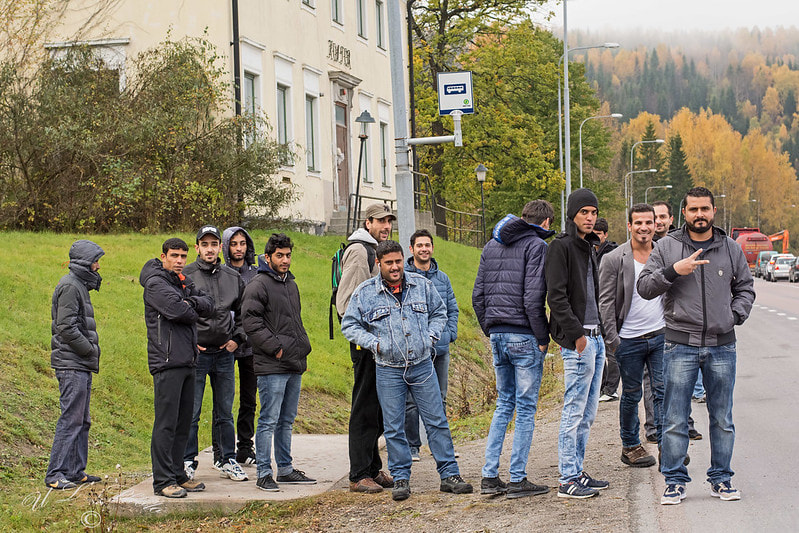Problem. |
|
According to A working paper made in 2016. link
About
percent of refugees aged 15-64 don't have tertiary level of education
Their employment rate is
Percent, which makes them most vulnerable groups of migrants on the labour market
|
Quick facts. |
1- In 2017, the number of refugees and asylum-seekers worldwide was nearly 29 million.
2- The median age of international migrants (Including Refugees) worldwide was 39 years in 2019
3- In 2019, the number of international migrants below age 20 reached only 13.9% of the global migrant stock.
4- In 2014, 1.8 million refugees resided in the 25 countries of the European Union. Only 1 out of 5 (20%) refugees aged 15-64 had a tertiary level of education.
5- Almost 60% of employed tertiary-educated refugees in the EU are overqualified for the jobs they occupy
6- Bringing refugee women into employment is a particular challenge. Low education and low labor market participation contribute to the trend.
7- Refugees represent one of the most vulnerable groups of migrants on the labour market.
|
Results:
|
As those statistics indicate, we can say that:
- The ratio of refugees who have a tertiary level of education and those who don't is 2:8! in 2014. That means there is a large gap in the educational level between refugees. - The median age of refugees is above 30! That means a large number of refugees exceeded the educational age by 10 years or even more! Those refugees will tend to work rather than continue their education which will take more than 4 years. They want to support their family, and they want to be secured and financially Independence. - Even those who have a tertiary level of education, 60% are overqualified for the jobs they occupy. For example, a Syrian woman used to be a nurse in Syria, and after she moves to Germany as a refugee, she started to work as a waitress! why? Because she lacks foreign educational credentials, work experiences, skills that won’t enable her to work in her major. - On the other hand, employers may also be hesitant to employ refugees because they are unclear about the refugee employment laws in their countries and consequently take the conservative approach of not hiring refugees. Companies often also do not see a business case for hiring refugees. Many view hiring refugees as a corporate social responsibility obligation rather than being beneficial to the business. |
|
Resources
|
- OECD Secretariat and the DG Employment, Social Affairs and Inclusion of the European Commission in 2016
- UN - Department of economic and social affairs - International Migration 2019 Population Division |
Solution. |
Solving this problem will take two ways!
|
#1
#2
|
We should help refugees to purse a tertiary level of education. This solution Involve refugees who are willing to continue their education and reach a high value career. Kiron (NGO) has already established a platform for this purpose!
Facilitating the Insertion of Refugee into the labor market through the establishments of specialized educational platform that qualify those people to meet the labor market needs. This is the solution, I am intending to establish.
|
Steps involved in solution NO.2
|
1- Partnering with organizations, companies, or businesses that are interested in building training programs to get qualified candidates to work for them. We will also educate them about the benefit of hiring refugees.
2- Working with non-profit organizations to build training programs and pathways to qualify and prepare refugees to fulfill these job requirements and meet the involved companies' needs. 3- Upon completion of these programs the trainee will work with the involved company. We should point out that refugees will tend to fill jobs that are usually shunned by the locals in developed countries. This makes businesses more productive and creates industry growth. 4- We will write success stories about the impact of those refugees, and how the companies they worked in became more productive. 5- Other companies and businesses will be encouraged to involve in this project because they saw a practical example of the impact of this idea hence creating more impact. |
Who will benefit from this solution?
1. Refugees |
|
1- They will have the opportunity to get skills that will insert them into the labor market in a short period.
2- It will help refugees integrate into the host country. 3- Employment helps to increase refugee’s self-reliance and dependence on social services. 4- Employment would also help to increase access to other essential services such as healthcare and education. 5- This will allow the families of those individuals to live in a better environment away from shelters and camps. Their children will be able to continue their education and live their lives normally. |
2. Host country |
|
The host country usually also benefits as refugees gain legal employment, it helps to grow the economy and increase the tax base.
Studies have estimated the impact of legalizing immigrant employment on US economic growth to be 0.8% or about $15.2 billion per year. A similar study in Malaysia estimates the impact of legalizing employment for refugees to be RM3 billion in GDP growth by 2024 and an increase of RM50 million in tax receipts. This happens through various mechanisms, including increased consumer spending from refugees who have improved incomes. Source : Refugee employment benefits |
3. Business & Companies |
|
Business will also have benefits. Refugees tend to have lower turnover rates, and it will help reduce the business cost of rehiring.
Companies that will participate in building training and pathways will have enough qualified candidates to fill the jobs that lack them. Refugees tend to fill lower value jobs which are usually also jobs that locals shun in developed countries. This makes businesses more productive and creates industry growth |
Is there any example that can support you solution? YES!
Google established a training program called Google IT Support Professional Certificate
|
Why did Google created this program?
Google has long faced an issue that many other companies also contend with -- we had open IT Support roles, and not enough qualified candidates to fill them. So, a few years ago we began working with a non-profit organization to build out trainings and pathways to roles in technical support at Google. We learned that not only is IT support a highly teachable field, but that we could teach someone completely new to the industry the IT fundamentals in under six months. So, we decided to build an IT training program on Coursera, created entirely by Googlers who are expert in IT support, so that this training could be available to everyone. |
|
This is the main idea. Refugees need to get employed but they lack the skills, on the other hand, Companies like Google needs qualified candidates, but they lack them.
And here comes our role, by making refugees qualified enough to meet those companies' needs. Everyone wins!
And here comes our role, by making refugees qualified enough to meet those companies' needs. Everyone wins!
|
Want to see this solution in the feature?
Vote for us now! In JUNE 20TH 2020 VIRTUAL REFUGEE CONFERENCE |





